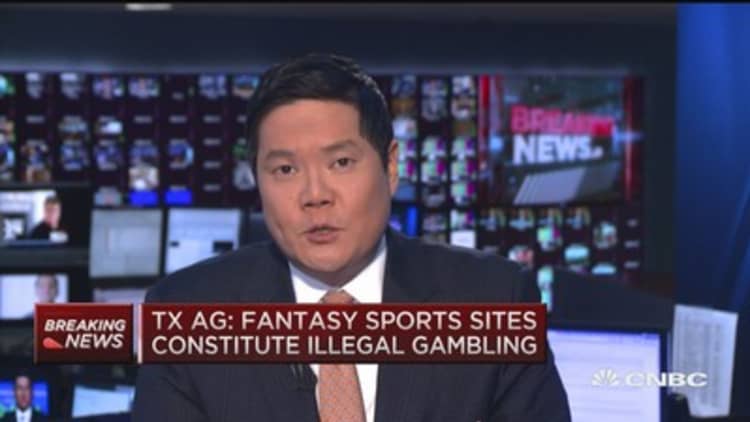At a rally outside the New York attorney general's office last November, dozens of daily fantasy sports players, some clad in jerseys and carrying signs, chanted, "DFS is a game of skill!"
The protest, organized by FanDuel, demanded that Attorney General Eric Schneiderman allow fantasy sites to operate in the state after Schneiderman argued that the games are illegal gambling. FanDuel and competitor DraftKings, which both still operate in New York as they appeal Schneiderman's attempted shutdown, have repeatedly stressed that their games require skill.
The laws vary from state to state, but generally, games that involve chance are legally considered gambling. States hold different standards for how much chance is required for a game to be considered gambling.
DraftKings' launch in the United Kingdom last week, and FanDuel's pending plans to expand there, could complicate that fundamental skill argument. Both companies applied for gambling licenses in the U.K., even as they fight that "gambling" label so that they can continue operating in the United States. DraftKings has received its license.
U.K. and U.S. gambling rules differ, so the companies' actions abroad by no means doom their arguments at home. But the gambling licenses may open the companies up to more attacks as the fantasy industry lobbies states for laws that more clearly authorize its contests.
"It undercuts the DFS operators' contention that they're offering purely an entertainment product and not a gambling product," said Daniel Wallach, a sports and gaming attorney at Becker & Poliakoff.
DraftKings and FanDuel, the two largest daily fantasy sites, have raised more than $350 million each in private funding. Their popularity has grown, and FanDuel reports that it has more than 1 million active users.
In daily fantasy, players pay fees to enter a short-term contest, choosing a lineup of real athletes and potentially winning money based on those athletes' performance. The legal wrangling stems from how much chance is involved in the games.
Momentum for the largely unregulated daily fantasy industry has slowed amid several legal challenges at the state level. Attorneys general in Illinois and Texas, among other states, have argued that daily fantasy contests would likely be considered gambling under state law. Nevada also required that operators have a gambling license, and DraftKings and FanDuel left that state rather than apply for one.
With revenue threatened in some U.S. markets, a U.K. launch allows DraftKings to tap into a fresh cash pool. DraftKings offers European soccer contests, which will likely attract more interest there than its American sports games.
The gambling license applications offer more fodder to attorneys general or lawmakers who are critical of daily fantasy, Wallach said. The Nevada Gaming Control Board said last year that DraftKings' U.K. license created an "appearance of inconsistency."
But DraftKings' and FanDuel's applications for licenses show their willingness to submit to more oversight if it means clearly operating within the law, said Marc Edelman, an associate professor of law at Baruch College who consults on fantasy sports law.
"Operating in England, or in any countries around the world where gambling is legal with a license, is probably safer for revenues," he said.

In a statement to CNBC, FanDuel stressed that launching in the U.K. was the "logical next step" for its business, and applying for the license was a requirement to do so. DraftKings declined to comment on the license.
Both companies have said publicly that they would willingly face more oversight. They have lobbied state lawmakers for legislation that would impose regulations and consumer protections while allowing them to operate freely.
DraftKings and FanDuel have previously indicated that they do not want a gaming commission or other gambling authority regulating them in the United States.
In fact, daily fantasy legislation was pending in an estimated 19 states at the start of February, according to GamblingCompliance Research Services, a gambling industry research firm.
Disclosure: Comcast and NBC are investors in FanDuel.




